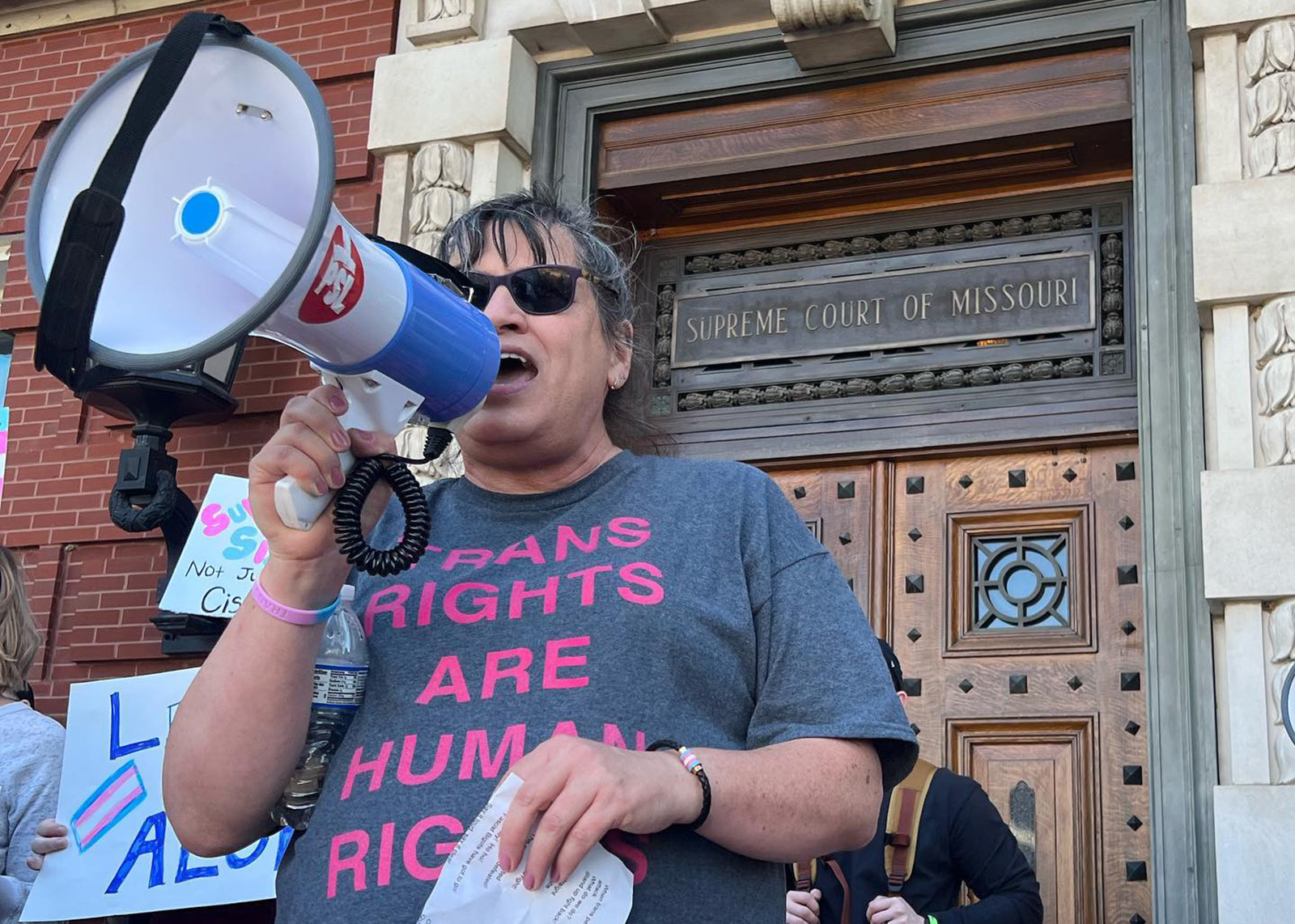Ivy posted a celebratory announcement on an online forum May 16. Dozens of Springfield and Missouri and transgender residents began subscribing to the forum about a month prior.
“The AG's order is officially dunked on!!” Ivy wrote on the Discord server she’d created. “He didn't even try to defend it in court. Savage.”
The order, had it ever been enacted, would have placed several hurdles between a Missouri resident, regardless of age, and access to gender-affirming care. When Missouri Attorney General Andrew Bailey first released the language of the emergency order on April 13, he called gender transition interventions, such as prescribed puberty blockers, cross-sex hormones and gender-affirming surgery “experimental,” and said he was fighting for children.
The order also called for anyone receiving gender-affirming care, regardless of age, to provide years’ worth of documentation — including proof of 15 therapy visits over 18 months and three years’ worth of diagnostic proof of gender dysphoria — to justify access to it.
Bailey’s order inspired Ivy to create the Discord server in mid-April. There, she and others in Missouri shared the latest information they had from their physicians regarding access to gender-affirming care. Shortly after Bailey’s order language was released, many sought to refill prescriptions for estradiol and other gender-affirming care hormone treatments for three months. Some made appointments with Planned Parenthood’s office in Fairview Heights, Illinois, just across the Mississippi River from St. Louis. Over a month, the online community’s membership expanded to include trans residents in other states where legislative efforts have targeted access to care, including Florida, Idaho and Nebraska. There are also people in the forum from California, Illinois — states that members of the Springfield area’s trans community are looking to as safe havens.
“(The Discord forum) kind of took off,” Ivy said in early May. They requested anonymity from the Hauxeda due to safety and security concerns. “I think it was a really good outlet for a lot of our frustrations. And now we're kind of sitting at a point where a lot of us are trying to figure out what the future is going to look like in our state and whether or not it's smart for us to stay inside it or for us to leave. And we're kind of just sitting at that knife's edge where a lot of us don't really know what to do or what's coming. For me, personally, I'm considering leaving.”
Ivy and two friends are planning to save money through the summer and fall. In early May, Ivy said they planned to move to Reno, Nevada, later this year. Ivy is intersex, meaning she was born with both male and female traits. While she is not transgender, she said she found the language of Bailey’s order vague enough to affect her health care access when she read it.
“For me personally, my body does not naturally produce any hormones,” Ivy said. “And so if I were to get cut off of this care, it would literally kill me over a period of time. And it's not something that I can find an exception for unless I pay $2,000 to get a karyotype test.”
Two days after Bailey rescinded the order, Ivy was asked again if the three planned to move. Ivy said yes.
“We definitely just want to live somewhere where we can just exist in peace,” she said.
Springfield’s LGBTQ advocates offer support

At the GLO Center, the question of whether or not it’s time to leave Missouri is weighed more often by more people who have shown up for weekly support group meetings for Springfield trans and questioning residents. Tonya Claiborne and Dawn Slack help facilitate the support group meetings. Leaving is a decision that Lou Hood, the GLO Center’s executive director, said they understand people making even as the political climate cements Hood’s own decision to stay in Missouri and fight for LGBTQ rights. Moving is a decision several people at a recent GLO Center young adult group said they can’t even consider due to financial constraints.
Gwendolyn Schwarz, 23, helps lead that group. A recent film and media studies graduate at Missouri State University, Schwarz is one of the people planning to move with Ivy and another friend to Reno.
“I don't necessarily want to leave, because I think I can make a good impact here,” Schwarz said. “But at a certain point, I just want to get out because I know with everything that's been happening this last month or so with the emergency order going up and then going down. I went into survival mode. And mentally, that's all I could think about was, ‘How am I going to get out of here?’”

For Schwarz, survival mode involved getting her documents in order in an effort to comply with the emergency order, which would have been in place from late April through February 2024 had it been enacted as Bailey initially intended. Schwarz first came out as non-binary in 2019, and began taking gender-affirming hormones in May of 2021 after secondary sex characteristics, like body hair, began to emerge. She said she didn’t identify with the characteristics and didn’t initially realize there was a word for what she was experiencing — dysphoria.
“It was a slow road,” Schwarz said of hormone therapy. “Nothing changes overnight. It’s definitely been a huge change almost two years on it, but it has been really awesome. My parents know that I’m trans. I live with them. I’m sitting in the house right now, and they’re conservative. However, they’re very supportive of me.
“It’s been really awesome and it’s been really nice to be able to look in the mirror and finally love myself.”
Although Schwarz did not receive gender-affirming care until she was in college, she said she was gender non-conforming and questioning at an early age. It’s a subject she has addressed in previous therapy sessions, and Schwarz was able to track down proof of visits with several therapists in case the state government required her to produce it. That another of the proposed executive order’s requirements called for people seeking gender-affirming care to resolve any mental health diseases prior to receiving it confounded Schwarz.
“Accessing gender-affirming care made me way less depressed,” Schwarz said. “Taking that away will only make trans people more depressed and more scared for their lives and more anxious about how they’ll be treated. So how do you expect trans people to continue accessing care if they’re perpetually depressed and therefore can’t get on gender-affirming care at any point?”
Schwarz said she was “scared into wasting a lot of my emotional energy and time” to make sure she complied with an order that never went into effect. While she protested the legislative efforts aimed at banning access to gender-affirming care for trans youth, Schwarz said she wouldn’t be planning to leave the state if not for the proposed executive order aimed at adults. She, Ivy and others interviewed by the Daily Citizen expect Missouri Republican leaders to try again to restrict access to care for adults.
Missouri AG rescinded order May 16

Bailey rescinded the order less than a week after all but three Republicans in the Missouri House of Representatives voted in favor of a bill to ban access to gender-affirming care for all minors. It also ends Medicaid coverage of gender-affirming care treatment for adults. The bill, as well as another that bans transgender girls and women from playing on female sports teams, are on the governor’s desk. Each would expire in 2027.
As legislators debated the bills in hearings and lawyers defended or challenged the legality of Bailey’s order in a St. Louis County circuit courtroom, Ivy live-streamed and transcribed the proceedings on the Discord channel. She said many in the trans community watched with bated breath.
“I’ve had people message me directly that they were feeling so singled out and (like they were) forcibly going to be isolated from their own community that they didn’t really want to go on anymore. I’ve had people message me that, late at night when they’re feeling super terrible. I mean, it’s just all so unbelievably f—-ed up to be used like this as a wedge issue.”
“We're not mentally ill people,” Schwarz said. “We're not, you know, like monsters or trying to groom children. I just want to go to grad school and have a job and be a contributing member of society.”
Instead of enrolling at MSU, Schwarz is looking at the University of Nevada-Reno. She’s also been in contact with Reno’s version of the GLO Center.
“I’m not done trying to help the community,” Schwarz said. “I just don’t know if it’s entirely safe to do it here. But it shouldn’t be all on queer people to take up these efforts. Cis people, and heterosexual people or allies in general, should be helping as well, because they have more political power than many people from my community do.”
Some say they’re staying to fight, others because they have no means to leave

Dawn Slack has talked with people closest to her about the possibility, and impossibility, of leaving Springfield for another state. Slack, 31, grew up in Missouri and has considered leaving for reasons centered around her education and career.
“Now it comes down to matters of health and personal safety,” said Slack, who began receiving gender-affirming care about two years ago.
Moving, she said, is a major decision and a huge expense. Slack and her friends, like Schwarz and Ivy, have considered leaving Missouri together. There are reasons Slack doesn’t want to leave, like her involvement in Refuge, a weekly support group at the GLO Center for anyone who falls under the trans umbrella, from out to questioning.
The decision is mostly financial. Slack, a food delivery driver, doesn’t have savings to tap to make a move.
“Ultimately, it comes down to just, most of us are poor,” Slack said. “We can't move. We can barely eat. We don't have a U-Haul. We can't get out of here. Thank God that the AG backed down because if he didn't, I don't know what we'd be doing right now, honestly.”
In the meantime, Slack talks about leaving Missouri in response to the political climate the way some people on the East Coast talk about hurricanes.
“Just for me personally, I’m still making backup plans and trying to save up some money just in case something happens,” Slack said. “In case things go south and we need to do an emergency evacuation. I don’t know what that would look like, but just in case we need to get out immediately — if things get violent, which is a possibility. The AG backing down has given us a little more time, I believe, but I’m still making backup plans just in case.
“But just to put it simply, I’m staying because I have to. Because I’m just poor.”
Support group leaders say stability threatened

Slack is a co-facilitator of the Refuge group, along with Tonya Claiborne. In recent weeks, Claiborne said, a handful of new faces have shown up for the weekly meetings. It’s gratifying to be there for them, Claiborne said, but it’s also painful.
“The heartbreaking part is obviously that people who do have some semblance of stable lives are feeling threatened,” she said. “I very much respect and understand the people that are making the decision to leave, and how difficult and honestly heartbreaking that is. I mean, it's heartbreaking for me that they feel like they have to do that, but I understand the necessity for self-preservation and self-care.”
Claiborne began transitioning in her 50s and has been receiving hormone replacement therapy since 2019. She said she called her doctor after the attorney general’s order came out and asked, essentially, “Hey, am I still good?”
“I went ahead and got my refills within the timeframe that I could just to make sure that I can still get them,” Claiborne said. “I even experienced some panic for myself.”
Claiborne said she has not had any internal debate about leaving her Springfield home.
“There was, you know, definitely a passing thought (that) it would be nice to live somewhere more supportive,” she said, and then she named the three reasons it was only a passing thought.
“One, economic means. Two, roots. And three, dedication to fighting for oppressed people where the oppression is going on. And Missouri is definitely front and center of that.”
Being part of the fight resonates for Lou Hood, the 22-year-old interim executive director of the GLO Center.
“It’s hard to justify putting yourself in harm’s way,” Hood said. “But it’s also hard to justify walking away from others who maybe can’t protect themselves as well.”
Hood, who uses they/them pronouns, is not receiving gender-affirming care, but said they want the option to remain on the table in Missouri in the future.
“As much as it’s hard, I feel this obligation to be where there are problems because that is the only way to fix it,” Hood said.
‘I am not worried about losing my care’ says trans woman
About 1.6 percent of all U.S. adults identify as transgender or non-binary. In Springfield, that would equate to roughly 2,250 people. No community, regardless of size, is a monolith.
After Bailey announced the emergency order in April, Teresa Trower, a trans woman who transitioned in her 50s, said she read the entirety of the order and opined about it on her Facebook account. Trower disagreed with some of what Bailey’s measures geared toward adults, but was mostly nonplussed.
“I am not worried about losing my care,” Trower said in early May, before the order was rescinded. “I’m not worried about having to go on the black market to get my estradiol. It’s really a non-issue for me. But again, it boils down to the AG, who is basically throwing mud at the wall and seeing what’s going to stick. And I think the courts are going to go in here, especially with what’s happened with the law, and strip away anything dealing with adults but leave it in place for the kids.”
Trower said she agrees with Republican-led efforts to restrict access to care for minors.
“That’s a huge adult decision to make,” Trower said. “Even with me, at age 56, it was a huge adult decision because it meant that everything about my life was going to change irrevocably.”
It’s a view Trower acknowledged runs counter to those expressed by trans friends she met through a support group she joined soon after she began her transition in 2020, 18 months after Trower’s wife of nearly four decades died. Trower said she knew she wanted to be a girl as early as age 6, but hid her identity from everyone after experiencing ridicule as a child. Today, she has had top and bottom surgery, and said she’s “living the life and loving it.”
Agree to disagree

Trower said she empathizes with her friends in the trans community who read the executive order and felt targeted, even if she strongly disagrees with them.
“I mean, I'm not going to excommunicate my friends because they don't think the same way I do,” she said. “And at this point, none of them have excommunicated me.”
Prior to transitioning, Trower was a Pentecostal Christian conservative, and she remains such even after she transitioned and her longtime Assemblies of God pastor asked her to leave the church she called home for decades. Trower has since found a home at Hope Church, but said she was asked to leave another church before finding it.
“Now I’ll be honest,” Trower said. “This plunged me into an extremely deep depression. The vast majority of those that go to church in the trans community have had church hurt like this. I was to the point of suicide.”
To the leaders of the churches that wouldn’t have her, Trower mailed letters. Each was addressed to the leader. Each letter contained a reference to a single verse from the New Testament: Matthew 10:14.
“That’s all the spirit would allow me to write,” she said.
For those that don’t know it, the King James version reads: “And whosoever shall not receive you, nor hear your words, when ye depart out of that house or city, shake off the dust of your feet.” The English Standard Version of the Bible verse reads: “And if anyone will not receive you or listen to your words, shake off the dust from your feet when you leave that house or town.”

